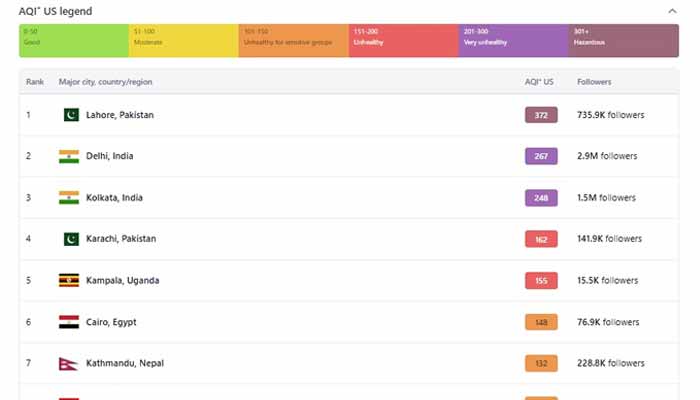LAHORE, NOV 4 – The Lahore High Court (LHC) on Tuesday ordered a complete ban on commercial activities every Sunday in Lahore as part of efforts to curb worsening smog and environmental pollution in the city.
LHC Justice Shahid Karim heard a set of petitions on environmental issues and ordered the complete closure of commercial activities on Sundays and strict enforcement of the 10pm closure for marriage halls in Lahore.
Lahore, the capital of Punjab province, was ranked as the most polluted city in the world again on Tuesday.
Lahore recorded an Air Quality Index (AQI) of 372, categorised as “hazardous” at 8:30am on Tuesday, according to the Swiss air monitoring agency IQAir.

During the hearing today, Deputy Commissioner Lahore Musa Raza appeared before the court and presented notifications mandating the closure of markets and restaurants by 10pm.
“The purpose is not merely to issue notifications but to ensure their implementation,” the LHC judge remarked.
The court further ordered that a director-level officer from the environment department appear at each hearing to brief the bench on progress.
A commission member informed the court that ongoing excavation near Khayaban-e-Firdousi was causing daily traffic jams.
WASA’s legal adviser, Irfan Akram, responded that the sewerage system across Lahore was being upgraded, and progress reports would be shared in the next hearing.
The LHC directed the Water and Sanitation Agency (WASA) to submit details and timelines of ongoing sewerage projects in the next hearing.
Subsequently, the court adjourned the hearing until November 7.
Authorities in Punjab attribute the poor air quality to polluted easterly winds blowing in from India and neighbouring regions. This toxic haze has enveloped much of Punjab and northern India for several days, severely reducing visibility and triggering health complaints such as throat irritation, coughing, and difficulty breathing.
The severe air quality coincides with the onset of winter, when cooler temperatures, stagnant winds, and emissions from vehicles, factories, and crop burning trap pollutants close to the ground across the plains of Punjab.
Every winter, a mix of low-grade fuel emissions from factories and vehicles, exacerbated by seasonal crop burn-off by farmers, blankets much of Punjab.
Breathing toxic air has catastrophic health consequences, with the WHO warning that strokes, heart disease, lung cancer, and respiratory diseases can be triggered by prolonged exposure.

















